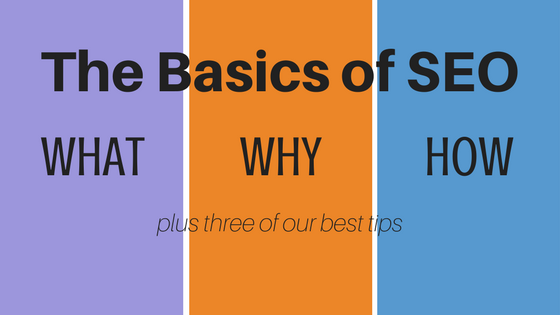Without a website, your business will have a hard time being found online. And even with a website, if potential customers can't find your site, they'll give their business to one of your competitors.

You've probably heard of search engine optimization, also known as SEO, but what it is and how to take advantage of it can be a mystery because it's constantly changing. Here is the what, why, and how of SEO for your small business website:
What is SEO?
Search engine optimization (SEO) determines how your website is found, or not found, in search engines.
Search engines send bots to your website that crawl for information to determine how to rank your website in relevant categories and for specific search terms. SEO is geared around what search engines value, which changes with time as they make updates and as online content shifts.
Why is SEO Important?
Search engines have complete control over how your website is found when potential customers use their search. Results on the first page of a search get over 90% of all search traffic. If your website doesn't come up on the first page of a web search related to what your business provides, then your competitors are getting that business without you even having a shot.
The better your website is optimized for search, the more visits your website will get, and the more opportunities you'll have to convert a visitor into a customer.
How Do You 'SEO'?
Just as there's no right or wrong way to build and run a business, SEO is a constant and ever-changing challenge. There are hundreds of SEO tip articles to learn from and use in your efforts, but I'd recommend starting simple. Just a few small changes could boost your website above your competitors in search results.
To cover just the basics, here are my three best tips when starting with SEO:
No. 1 - Research
Every effective SEO plan begins with research. Without research, you're just guessing, and possibly wasting your time and effort. To begin your research, you should know the following:
- Learn what on your website impacts SEO and make instant changes to your site.
- What are your potential customers searching for? Use Google's Keyword Tool (you will need a Google AdWords account).
- Research how your website currently ranks for your target keywords.
- Tip: Search using incognito mode on your browser as your results may be skewed since you’ve likely visited your website numerous times in the past.
- Choose a list of 10-15 keywords to focus your efforts on.
- Set your SEO goals.
With a few hours of planning and research, you can have a brief plan outlining your goals, what you need to do to reach those goals, and can then list the steps you need to take to turn this plan into action.
No. 2 - Use free and paid tactics
Organic search is where the majority of your traffic will come from. However, what if you don't show up on the first page of the search "Bloomington's Best Bakeries" and that search is vital to your business? Pay for it!
By using paid search, like Google AdWords, you can get your company listed on the top of a page for any keyword phrase you'd like (and you only pay Google fees if someone actually clicks on your ad!). Using both free and paid SEO tactics can help your business get in front of your audience immediately without waiting until your organic efforts finally get you on the first page of Google results.
No. 3 - Track, analyze, and adjust
When creating your SEO plan, write in pencil, not pen. What you do should always rely on the results you're getting, and you can't know your results without tracking and analyzing your SEO efforts. While tracking and analyzing, make adjustments as needed that are in line with your SEO goals.
Ask me about SEO! Mavidea hosts regular SEO Q&A sessions. Please send your questions to Jason.Lerblance@Mavidea.com. View one of our previous live Q&A's here.
